Multipurpose Cash Assistance
Multipurpose Cash (MPC) are unrestricted cash transfers that people affected by crises can use to cover their basic needs. By its nature, MPC is the assistance modality which offers people a maximum degree of choice, flexibility and dignity. There is also growing evidence that it is more cost-efficient and cost-effective to meet multiple needs.
But this requires new ways of collaborating between humanitarian actors, at all stages of the program cycle, and across sectors. While solid tools exist to support collaboration, they have not been widely adopted and MPC is still used in an ad-hoc way. Challenges remain to be addressed if we are to successfully fit MPC into the humanitarian system.
Featured content

Multipurpose cash outcome indicators and guidance
Guidelines and Tools
The indicators in this document, developed by the Grand Bargain Cash Workstream, focus on the primary objectives of humanitarian Multipurpose Cash Assistance (MPC), and the outcomes to which MPC can most strongly contribute in a given context.
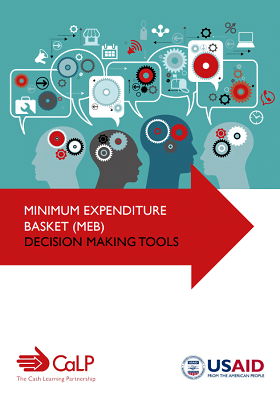
Minimum Expenditure Basket (MEB) Decision Making Tools
Guidelines and Tools
Update: This publication was revised in 2022. Please read the revised publication here.
The purpose of this tipsheet is to accompany practitioners and decision makers through key stages in the process of calculating an MEB to: (a)
identify what is the most appropriate path to take in relation to their
particular context, identified objective, existing capacities and available
resources; and...
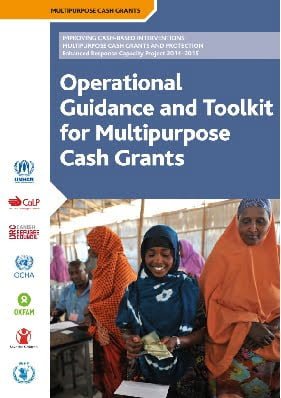
Operational Guidance and Toolkit for Multipurpose Cash Grants
Guidelines and Tools
This operational guidance and toolkit brings together worldwide expertise on cash-based interventions (CBIs). It provides comprehensive and practical guidance for humanitarian actors to assess the feasibility, conceptualise the design and structure the implementation of MPGs. The guidance focuses on MPGs whose primary objective is to meet basic needs as defined by affected people...

Definition of Minimum Expenditure Baskets (MEB) in West Africa
Report
Throughout 2017, five countries in West Africa have worked collectively to define minimum expenditure baskets, in order to better capture the contribution that humanitarian assistance is making to address the basic needs of affected populations, and improve the impact of assistance. This heavy process raises technical and coordination challenges. The CALP Network, with support from USAID /...
Thematic lead
Latest

Child Safeguarding for Cash and Voucher Assistance Guidance
Guidelines and Tools
As cash and voucher assistance (CVA) becomes ever more prevalent, it is more important than ever for humanitarian and development actors to act to prevent and mitigate associated child safeguarding risks.
Children are particularly vulnerable, and even more so in emergencies. The impact of CVA on...

CVA for Protection: A Mapping of IRC’s Use of Cash and Voucher Assistance to Help Achieve Protection Outcomes
Guidelines and Tools
The IRC first began to integrate cash into protection programs in 2013, leveraging the flexibility of CVA to support clients living in urban refugee contexts in the Middle East. Since then, IRC has rapidly expanded its use of CVA to help achieve protection outcomes. This scale-up has come with important...

Cash for Work (CFW) Guidance Note
Guidelines and Tools
Cash for Work interventions provide employment to unskilled and semi-skilled workers on labour intensive projects such as rehabilitation of irrigation systems, soil conservation, and road construction and maintenance.

Healing and Enabling- Stories from Typhoon Mangkhut Response
Report
The response to Typhoon Mangkhut is one of Christian Aid’s purely cash-based response that incorporate a community-led approach in its design and execution. Undertaken with our NGO and community partners, it has been in keeping with Christian Aid’s development principle of working with, and through...
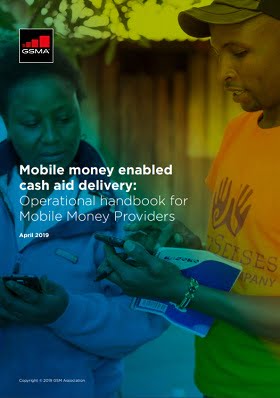
Mobile money enabled cash aid delivery: Operational handbook for Mobile Money Providers
Guidelines and Tools
Section 1 of this handbook provides essential background on the humanitarian sector and cash and voucher assistance (CVA) programmes. A brief overview of the business case for CVA delivery identifies the potential revenue streams that can come from building long-term strategic partnerships with...
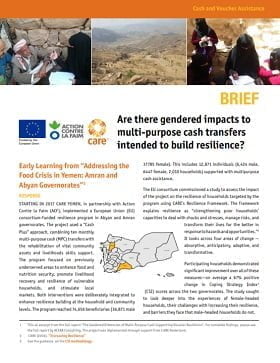
Are there gendered impacts to multi-purpose cash transfers intended to build resilience?
Report
Brief from full report “The Gendered Dimension of Multi-Purpose Cash Supporting Disaster Resilience” extracting the specific gendered findings from a study on the impact of an EU funded project that used a “Cash Plus” approach, combining ten monthly multi-purpose cash (MPC) transfers with the...

Analysis of social and power dynamics of stakeholders for the implementation of multi-year MultiPurpose Cash Transfers in North Mali
Report
Six INGOs (Hunger Against Action, Danish Refugee Council, Handicap International, Oxfam, Solidarités International and International Rescue Committee) have been implementing a MultiPurpose Cash Transfers programme in Mali; the second phase of this social safety net intervention targets the communes the...

Reflections and recommendations from evaluations of the 2017 CVA Somalia Drought Response
Report
Improving our response to drought to avert crises through the use of cash and voucher assistance requires us to build on experience. This paper pulls together reflections and recommendations from a review of eight evaluation reports, reviews and studies that were conducted during or after the 2017 drought...
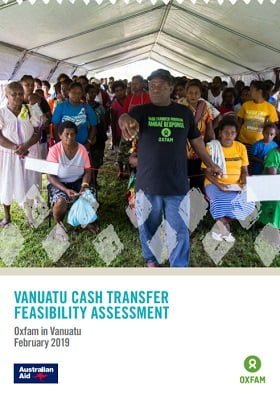
Vanuatu Cash Transfer Feasibility Assessment
Report
Oxfam conducted this Vanuatu Cash Transfer Feasibility Assessment in partnership with Youth Challenge Vanuatu, Department of Agriculture & Rural Development, and the Vanuatu National Statistics Office with funding from the Australian Department of Foreign Affairs and Trade (DFAT) through the Australian...

The CALP Network-Asia Pacific Regional Cash Working Group learning event report
Report
On 20-22 May, 27 cash working group (CWG) coordinators and regional technical focal points convened from Afghanistan, Fiji, Indonesia, Laos, Myanmar, Nepal, Pakistan, the Pacific region, the Philippines and Vietnam to share experiences and strengthen coordination between country, regional and global...

Vanuatu Cash Transfer Feasibility Assessment – Report summary
Report
This is a summary of the findings of the Vanuatu Cash Transfer Program (CTP) Feasibility Assessment that was conducted to build a context-specific evidence base to guide preparedness initiatives related to the use of cash and vouchers as a means of humanitarian assistance for response, recovery and...

Improving the Coordination of Humanitarian Cash Transfers – a Fool’s Errand?
Report
Master’s thesis – NOHA Master’s in International Humanitarian Action. This thesis evaluates the extent to which attempts to improve the coordination of multi-purpose cash transfers (MPCTs) in humanitarian contexts can succeed. The first part of the paper focusses on outlining the existing...
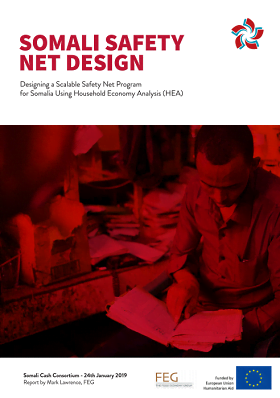
Somali Safety Net Design: Designing a Scalable Safety Net Program for Somalia Using Household Economy Analysis (HEA)
Report
The aim of the study was to use existing household economy analysis (HEA) data to help in the design of a scalable cash-transfer-based safety net program for Somalia. The study made use of a recently completed 15-year (30-season) time series analysis covering 13 livelihood zones in Somalia.

Introductory Research on the Feasibility of Cash and Voucher Assistance in Rural Fiji
Report
This report presents the findings of a study into the general feasibility of using Cash and Voucher Assistance (CVA) in responding to disasters in Fiji. The term “Cash and Voucher Assistance” or CVA, is used in the report in line with the the CALP Network definition, so it refers to programs where...
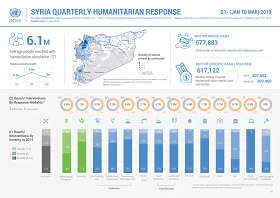
Syria Quarterly Humanitarian Response (Q1 January to March 2019)
Report
Summary of the humanitarian aid delivered to beneficiaries in Syria during Q1 2019

ESSN Programme Technical Analysis
Report
The Technical Analysis study has been conducted with the aim of referring the individuals in the ESSN Programme beneficiary pool to the livelihoods in terms of its scope and content. With the purpose of increasing beneficiaries’ economic and social resilience and self-sufficiency by reducing their...

Can cash transfers in humanitarian contexts help prevent, mitigate, and respond to gender-based violence? A review of the evidence
Report
Today, approximately 10 percent of humanitarian assistance globally is delivered via cash transfer programming (CTP) and cash is increasingly being scaled across the humanitarian system. Yet the use of cash within the protection sector trails behind the use of cash in all other sectors. Refugee and...

Cash Impact on Food Security and Non-Food Outcomes: Ministudy II
Report
To better understand how different amounts and frequencies of cash transfer impact household food security outcomes and non-food outcomes (food well-being, financial well-being, ability to cope with shocks and stresses and household well-being), this study compared the project outcomes for 3 groups: a...

Cash transfer Programmes – Impact on Stunting and Financial Inclusion
Report
This report focussed on evidence published in the last ten years (since 2009) on cash transfer programs’ impact on stunting and financial inclusion. The importance of maternal education on stunting emerged from the literature and warrants further investigation, which was outside the scope of this...
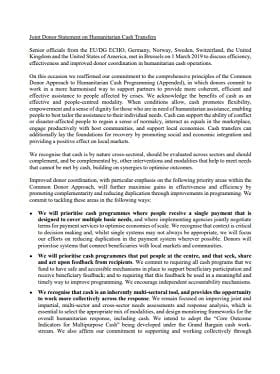
Joint Donor Statement on Humanitarian Cash Transfers
Guidelines and Tools
As part of continuing efforts to strengthen donor coordination on cash, a group of senior officials from major donor agencies (EU/DG ECHO, Germany, Norway, Sweden, Switzerland, the United Kingdom and the United States of America) met in Brussels on 1 March 2019 to discuss shared approaches. Building on...




